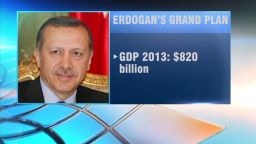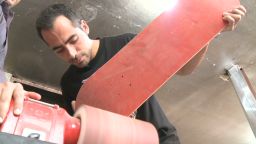Watch Marketplace Middle East every week on CNN International. Click here for the show times.
Story highlights
Recep Tayyip Erdogan sworn in as new president of Turkey
Erdogan was elected as the country's prime minister three times between 2003 and 2014
The country's growth has stalled in recent years and ratings agencies have warned of political and social unrest
Recep Tayyip Erdogan was officially sworn in as Turkey’s new president Thursday after comfortably winning the country’s first direct vote to decide its head of state earlier this month. The appointment could see the 60-year-old former semi-professional football player remain at the top of Turkish politics for at least another decade.
Erdogan was elected as prime minister of Turkey three times between 2003 and 2014 but the internal rules of his Freedom and Justice Party (AK) prevented him from running for the position again. While the presidential role is designed to be a ceremonial one – akin to that held by the Queen in the United Kingdom – Erdogan has already indicated a desire to change the constitution that will see his remit extended.
But how do businesses on the ground feel about Turkey’s future and Erdogan’s continuing role in front line politics?
Foreign direct investment surged tenfold from just $20 billion in 2001 to over $200 billion today while massive infrastructure projects like Istanbul’s Marmaray Tunnel were completed under Erdogan’s watch. However, growth has slowed to just over 2% in recent years and international ratings agencies such as Moody’s and Fitch have cautioned investors over political and social unrest within the country.
CNN’s John Defterios spoke with Besir Ustaoglu, President of the American-Turkish Chamber of Commerce, about the prospects for the emerging market economy, with its 80 million consumers.
He started by asking whether he was concerned by Turkey’s slower rate of growth in recent years.
Besir Ustaoglu (BU): We have been growing quite rapidly in the last ten years. (But) nowadays the economy is slowing down, you are right. We should be expecting to see a growth rate of 3% to 3.5% in the next few years.
John Defterios (JD): This is a difficult time because of the unrest in Iraq which could last a few years. You have the challenges to the south in Syria, and Europe is slowing down again. Where do you get your export growth?
BU: Well the neighboring countries in the southern part of Turkey, Iraq and Syria were our main partners for export in the old days – actually being the main gateway to the Middle East Markets. Going through Syria, Turkey was exporting to almost a dozen markets. You are right, it has stopped and now the European Union is going through recession.
Hopefully the United States and the European Union is working on the Trans-Atlantic Trade and Investment Partnership (TTIP) project. Turkey is a partner and is exporting to both the EU and the United States.
JD: Years ago though, Mr Erdogan was touting great growth to the Middle East and Africa. Africa is still in play but the Middle East is very chaotic. This is really going to undermine the prospects for the next few years, isn’t it?
BU: Of course after the Arab Spring, in northern Africa – where Turkey had so many contractors in Libya, in Egypt and Algeria – this also didn’t help the Turkish economy. I hope in the near future all these conflicts will be resolved and again Turkish contractors will again take their place in these countries.
JD: You’ve had Mr Erdogan in office as prime minister for almost a dozen years. He could be in power (as president) for another ten years. Does this not concern you, that there’s a centralization of power under one personality and one individual?
BU: Not really, because if you look at it Turkey has had its best time in terms of economics and social welfare in the last 12 years. Since November 3, 2002, things have been really growing. (That’s) a good track record of a dozen years, as you say, of managing the country and (managing) relations (with the likes) of Europe and the United States.
I think Mr Erdogan (should be) given a chance to see what happens in his presidency.
JD: It’s interesting to see the ratings agencies, particularly Fitch and Moody’s, are putting a question mark over domestic political challenges. Do you think that’s fair?
BU: I don’t think so. If you look at the Turkish economy we have our own dynamics. If you look at production, it is increasing. Unemployment is not so bad. We have an average age of 29, it is a big consumer market. So ratings institutes, I don’t know why they are trying to reduce the ratings of Turkey.
Read: Is Qatar 2022 a World Cup own goal?






















